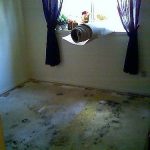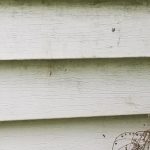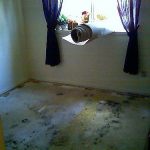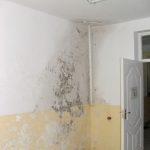Looking for a new home is an exciting venture, especially if you are a first-time home buyer. The feeling you get when you find the right home is amazing, but you must stop yourself from getting too excited until you give the home a thorough inspection. One of the biggest issues you should check for before purchasing a new home is mold. Mold is a very serious problem that is sometimes difficult to spot in a home, and sellers are not always upfront about disclosing potential mold issues. If you buy a house with extensive mold growth, you will be responsible for mold remediation which can be quite expensive.

Before you close on a new home, make sure you inspect the home for mold according to the following tips.
The Dangers of Mold in a Home
There are many reasons why you should take every step imaginable to avoid buying a house with mold. Mold only forms when it has a moisture source which makes it more likely in areas that are regularly exposed to water and moisture. When mold colonies form, they use the affected materials as a food source and eat away more and more of the surface until the growth is removed. This can lead to permanent damage to the affected materials as well as serious structural damage.
The physical damage isn’t the only problem with mold, it can have a negative impact on your health. Symptoms of mold exposure include runny or stuffy nose, itchy eyes and throat, coughing, and skin irritation. Some types of mold may form mycotoxins that can cause more severe symptoms such as fatigue, asthma, and respiratory infections.
How to Inspect the Home for Mold
Mold is tricky because it can grow literally anywhere in a home including behind walls and ceilings, under flooring, behind paneling and wallpaper, and in areas like attics, crawlspaces, and basements. You must do a thorough inspection of the entire home to look for any sign of mold growth including watermarks, stains, and musty odors.
Also, don’t be afraid to ask the home inspector if they discovered any signs of mold.
- Check Vulnerable Areas: Make sure you check the areas most vulnerable to mold growth including kitchens, bathrooms, pipes, windows, roofing, laundry rooms, basements, attics, and crawlspaces.
- Ask Home Inspector: It is always a good idea to have a home inspector do a thorough inspection on a home before you buy. Home inspectors do not typically look for mold, but they will notice signs of water damage or mold growth. They also look in areas where you won’t so they might catch something you miss. Ask your home inspector if they found any signs of water or mold damage and if so, ask if they will add it to their report. Many home inspectors may not put it on the report to avoid liability, but they will at least tell you if they found anything you should know about.
- Ask the Seller about Mold or Water Damage: Only certain states require a seller to disclose information pertaining to mold or water damage, and in these states, they only have to disclose issues that they should reasonably be aware of. This means that they are not expected to remove walls and ceilings looking for mold. If your state does not require mold disclosures, you can still ask the seller about mold. You may also consider asking questions about pipe bursts or leaks that could cause mold.
- Talk to Real Estate Agents and Appraisers: Real estate agents are required by law in some states to disclose mold-related issues that they know about. A home appraiser will also notice signs of mold growth because this will factor into their appraisal. Talk to the real estate agent and appraiser to see if they have noticed any signs of mold.
- Make an Offer with a Mold Contingency: If you like the house so much that you must make an offer, include a mold contingency in your offer. This will allow you to back out of buying the home if a test or inspection reveals a mold problem. If you do not think that the home inspection and appraisal are enough, you can hire a professional mold removal company to do thorough mold testing.
What Should You Do if the House Has Mold?

If the home you are looking to buy has a mold issue, there are several ways you can handle this. If you have a mold contingency on your offer, you can try to get the seller to lower the price or fix the issue. Before committing to buying the home, you must consider if fixing the mold problem yourself will be worth the time and money it takes for effective mold remediation. If you have a young child or an elderly family member living with you, it may be best to walk away and continue your search for a new home.
Continuing your search for a new home may be frustrating, but it is better than buying a home with a mold issue that will become your responsibility. If you are searching for a home and suspect that it may have a hidden mold issue, do not hesitate to contact a mold remediation service provider to provide mold testing. These professionals will be able to tell you if the home has a hidden mold issue that you should be concerned about before buying the home.




